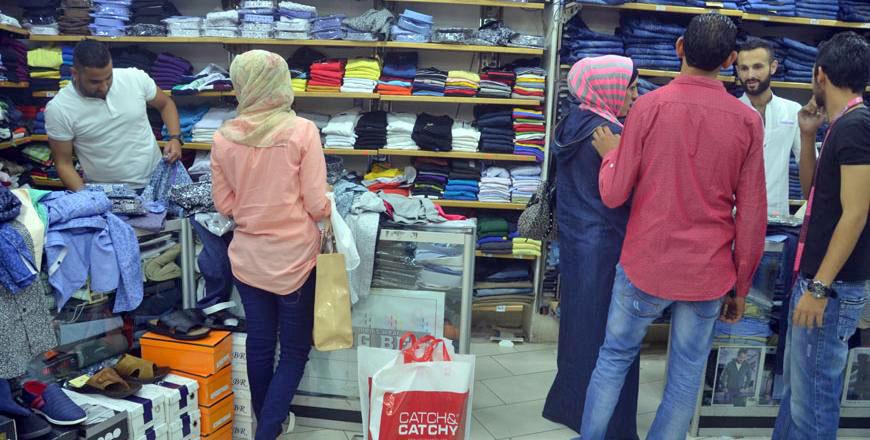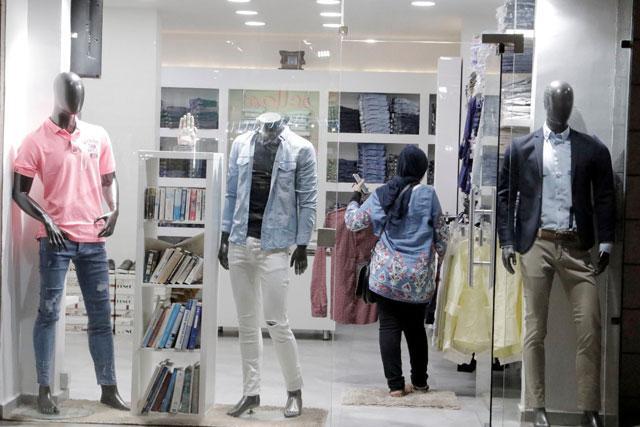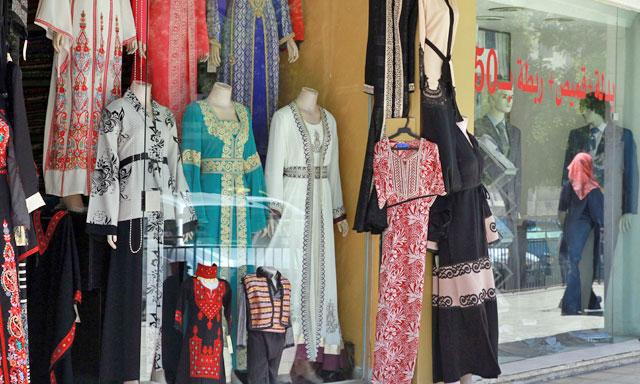You are here
Clothing sector calls for government aid amid sinking sales, rising taxes
By Bahaa Al Deen Al Nawas - Jul 13,2019 - Last updated at Jul 13,2019

Customers shop for clothes at a store in Jabal Hussein in Amman (JT file photo)
AMMAN — Apparel and clothing shops in Jordan have seen their sales plummet by 35 per cent during the first half of 2019 compared with the same period last year.
President of the Textile and Readymade Clothes Syndicate Muneer Deyeh told The Jordan Times on Saturday that customs fees, taxes and issues related to online commerce are behind the sales drop, and that they deepen the challenges already facing clothing shop owners and workers in the sector.
"We are hoping that government entities involved in economic decision making will help us, and these include the ministries of industry, trade and supply, finance and planning among other institutions," Deyeh said, urging the ministries to consult with syndicates, associations and chambers of commerce in order to come up with solutions.
There is a problem with uncoordinated and unsupervised sales, which is why the syndicate proposed a by-law it created to fix this issue, but nothing has happened so far, he said.
The syndicate has also presented many reports on the negative effects of foreign e-commerce, but also no action was taken, according to Deyeh.
Deyeh said that the more these problems remain, the worse things will be, especially for those unable to keep up and forced to close their shops and lay off their employees.
Moreover, he said that, in light of the recent cancellation of the free trade agreement between Jordan and Turkey, investments from Turkey have decreased and customs fees and taxes on imports from the country have risen.
The syndicate president added that the customs fees and taxes, often equalling more than 50 per cent of a commodity's price, have further hurt the sector.
Ahmad Karazon, a clothes shop owner in Zarqa who has been working in the field for over 15 years, said that this year a lot of apparel shops laid off their employees because of the tough economic conditions. The shops used to make JD200 a day but now they barely make JD40 to JD50 a day, according to Karazon.
"Even during seasons like Eid Al Fitr for example, the market has not seen any improvement whatsoever, so the recession has become more [harmful] than ever, especially in light of how people barely have any money to buy clothes every now and then," Karazon said, adding that, on any given Saturday, the market used to burst with movement, but not anymore.
Shadi Abu Jamous, another shop owner in Marj Al Hammam in Amman, said that operational costs, taxes and other expenses like wages have become too much, and those who have taken out loans to try and make things work are ending up in jail because of their inability to pay their debts.
"Anyone who strolls through downtown for a little bit will notice how many clothing shops are shutting down and how owners are unable to meet their obligations," he added.
The syndicate president said that clothing imports during the first half of this year decreased to JD63 million compared with JD81 million during the first half of last year — a drop of around 23 per cent.
Jordan's clothing imports come mostly from Turkey and China, in addition to some Arab, European and Asian countries, the Jordan News Agency, Petra, reported, adding that the sector employs around 53,000 Jordanians and has around 11,800 traders.
Related Articles
AMMAN — The government is currently studying how to better regulate e-commerce to mitigate losses to traditional brick-and-mortar shops, a m
AMMAN — From an evaluation of consumer behaviour in the clothing and footwear sector, it was found that many people have shifted from buying
AMMAN — Clothing sales during Eid Al Adha went down by 50 per cent compared to the same period in 2018.

















